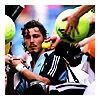Post by Teresa on Jan 9, 2005 20:00:44 GMT 3
The Sunday Times - Sport
January 09, 2005
Helping hand
BARRY FLATMAN
Tony Roche delivers a hammer blow to Lleyton Hewitt’s Australian Open hopes by agreeing to coach the world No 1
Rule No 1 in the Australian code of sporting ethics and life in general: look after your mate. Play the game hard and fair, and feel free to tell your opponents exactly what you think of them if you reckon it’s going to help. But never do anything that might harm the chances of one of your own.
Consequently, the silence Lleyton Hewitt has maintained over fellow Australian Tony Roche’s decision to lend counsel to Roger Federer has been curious. Never a person to keep quiet if he feels anything less than preferentially treated, the feisty young man in the back-to-front baseball cap has not shied away from attacking the organisers of the Australian Open for laying a playing surface so pedestrian that it does nothing to help his cause.
Yet any insight and advice that could strengthen Federer’s domination in tennis is potentially far more damaging to Hewitt’s chances of becoming the first Australian to win the calendar’s opening Grand Slam for 29 years than the rubbery compound laid at Melbourne Park. Hewitt makes no secret that his overriding aim is to lift the trophy this month. By agreeing to becoming Federer’s coach, albeit in a 10-weeks-a-year consultancy capacity, Roche could be accused of treason in some quarters.
There is not a player on the men’s ATP Tour who does not feel intimidated by the top-ranked Swiss when he walks on court beside him. And for good reason. Incredibly, the last time that Federer lost to a top-10 opponent was on October 18, 2003, when Juan Carlos Ferrero beat him in the semi-finals of the Masters Series in Madrid. Since then he’s beaten Hewitt six times out of six, scored four victories over both Andy Roddick and Andre Agassi and proved too accomplished for Marat Safin on three occasions.
Although Tim Henman beat him twice before returning to the top 10 last March, he has lost their past two confrontations. Henman delivered a succinct appraisal of Federer’s superiority after losing to him in the US Open semi-final last year: “If you take Roddick’s serve, Agassi’s returns, my volleys and Hewitt’s speed and tenacity, you’ve probably got a good chance against Roger. That’s a lot of people involved in beating one player.”
In Doha this past week, Federer has terrified the opposition in the Qatar Open. Spain’s Feliciano Lopez has been nominated as a potential outsider for Grand Slam contention this year. Some say the 23-year-old from Madrid has as much talent as his compatriot, Rafael Nadal. But after losing to Federer, he could only say: “He will win everything and there’s nothing anyone can do. He knows he can do anything on a tennis court and nobody can hurt him.” Federer cruised to victory in yesterday’s final, defeating Ivan Ljubicic of Croatia 6-3 6-1.
Even players who have long since laid down their competitive rackets are in awe. More than 3Å years have passed since Patrick Rafter last faced Federer across a net. Roche was sitting in Rafter’s coaching corner that day and Federer, although still a teenager, had begun to show signs of achieving his potential by breaking into the top 10. In much the same way as the agreement with Federer has been struck, Rafter worked with Roche only on an occasional basis. But the veteran’ s knowledge contributed hugely to the consecutive US Open titles Rafter won in 1997 and 1998, as well as his brief tenure of the world’s No 1 spot in 1999.
“When you get to that level, it’s up to you whether you want a coach around all the time,” recalled Rafter. “It’s not imperative, because you pretty much know how to play the game, and I didn’t want or need anyone there every day of every week. Maybe Roger’s the same. He seemed to have things pretty much worked out when he was on his own last year.
“He’s the most complete player I have seen, and I have never set eyes on anybody who hits the ball better. The scary thing — and Lleyton knows this better than anyone — is just a week here and there with Rochey, particularly at the Grand Slams, will tighten up a few things in Federer’s game and make him better. I know a lot of players have tried to hire Rochey, and it’s a huge feather in both guys’ caps that they agreed on this partnership.”
Roche is 59. A strenuous itinerary is not high on his list of priorities. He was Ivan Lendl’s full-time coach in the mid- to late 1980s and early 1990s, and before that he guided New Zealander Chris Lewis to an unlikely Wimbledon final in 1983. He served as Australia’s Davis Cup coach in tandem with his old doubles partner, John Newcombe, and was inspirational to Hewitt’s maintenance of composure throughout the potentially explosive final against Spain in Barcelona four years ago.
More recently, the Sydney-based coach has chosen to stay home in Australia, turning down job offers from Safin, Pete Sampras, Anna Kournikova and Henman, who saw the Australian as the best option to replace David Felgate in 2001 before making do with Larry Stefanki and then Paul Annacone. Roche is still technically employed by Tennis Australia as part of a junior development initiative and feels an obligation to continue working with junior Sophie Ferguson, whose brother was killed on a trip to Asia during the tsunami disaster.
Arthritis has caused the former French Open champion to undergo a hip replacement operation, and he requires another. On top of that, his parents died last year and his in-laws are in poor health.
Federer has long felt an affinity with Australian coaches after working with Peter Carter during his formative years. The pair parted company before Carter was killed in a road accident in 2002.
Hewitt maintains that Federer is not paramount in his thoughts as he prepares for the Australian Open, which begins in eight days’ time. But late last year he conceded that Federer had taken men’s tennis to another level.
Having somebody in the opponent’s camp who knows his own game intimately can hardly be conducive to Hewitt’s belief that he is about to make up lost ground.
January 09, 2005
Helping hand
BARRY FLATMAN
Tony Roche delivers a hammer blow to Lleyton Hewitt’s Australian Open hopes by agreeing to coach the world No 1
Rule No 1 in the Australian code of sporting ethics and life in general: look after your mate. Play the game hard and fair, and feel free to tell your opponents exactly what you think of them if you reckon it’s going to help. But never do anything that might harm the chances of one of your own.
Consequently, the silence Lleyton Hewitt has maintained over fellow Australian Tony Roche’s decision to lend counsel to Roger Federer has been curious. Never a person to keep quiet if he feels anything less than preferentially treated, the feisty young man in the back-to-front baseball cap has not shied away from attacking the organisers of the Australian Open for laying a playing surface so pedestrian that it does nothing to help his cause.
Yet any insight and advice that could strengthen Federer’s domination in tennis is potentially far more damaging to Hewitt’s chances of becoming the first Australian to win the calendar’s opening Grand Slam for 29 years than the rubbery compound laid at Melbourne Park. Hewitt makes no secret that his overriding aim is to lift the trophy this month. By agreeing to becoming Federer’s coach, albeit in a 10-weeks-a-year consultancy capacity, Roche could be accused of treason in some quarters.
There is not a player on the men’s ATP Tour who does not feel intimidated by the top-ranked Swiss when he walks on court beside him. And for good reason. Incredibly, the last time that Federer lost to a top-10 opponent was on October 18, 2003, when Juan Carlos Ferrero beat him in the semi-finals of the Masters Series in Madrid. Since then he’s beaten Hewitt six times out of six, scored four victories over both Andy Roddick and Andre Agassi and proved too accomplished for Marat Safin on three occasions.
Although Tim Henman beat him twice before returning to the top 10 last March, he has lost their past two confrontations. Henman delivered a succinct appraisal of Federer’s superiority after losing to him in the US Open semi-final last year: “If you take Roddick’s serve, Agassi’s returns, my volleys and Hewitt’s speed and tenacity, you’ve probably got a good chance against Roger. That’s a lot of people involved in beating one player.”
In Doha this past week, Federer has terrified the opposition in the Qatar Open. Spain’s Feliciano Lopez has been nominated as a potential outsider for Grand Slam contention this year. Some say the 23-year-old from Madrid has as much talent as his compatriot, Rafael Nadal. But after losing to Federer, he could only say: “He will win everything and there’s nothing anyone can do. He knows he can do anything on a tennis court and nobody can hurt him.” Federer cruised to victory in yesterday’s final, defeating Ivan Ljubicic of Croatia 6-3 6-1.
Even players who have long since laid down their competitive rackets are in awe. More than 3Å years have passed since Patrick Rafter last faced Federer across a net. Roche was sitting in Rafter’s coaching corner that day and Federer, although still a teenager, had begun to show signs of achieving his potential by breaking into the top 10. In much the same way as the agreement with Federer has been struck, Rafter worked with Roche only on an occasional basis. But the veteran’ s knowledge contributed hugely to the consecutive US Open titles Rafter won in 1997 and 1998, as well as his brief tenure of the world’s No 1 spot in 1999.
“When you get to that level, it’s up to you whether you want a coach around all the time,” recalled Rafter. “It’s not imperative, because you pretty much know how to play the game, and I didn’t want or need anyone there every day of every week. Maybe Roger’s the same. He seemed to have things pretty much worked out when he was on his own last year.
“He’s the most complete player I have seen, and I have never set eyes on anybody who hits the ball better. The scary thing — and Lleyton knows this better than anyone — is just a week here and there with Rochey, particularly at the Grand Slams, will tighten up a few things in Federer’s game and make him better. I know a lot of players have tried to hire Rochey, and it’s a huge feather in both guys’ caps that they agreed on this partnership.”
Roche is 59. A strenuous itinerary is not high on his list of priorities. He was Ivan Lendl’s full-time coach in the mid- to late 1980s and early 1990s, and before that he guided New Zealander Chris Lewis to an unlikely Wimbledon final in 1983. He served as Australia’s Davis Cup coach in tandem with his old doubles partner, John Newcombe, and was inspirational to Hewitt’s maintenance of composure throughout the potentially explosive final against Spain in Barcelona four years ago.
More recently, the Sydney-based coach has chosen to stay home in Australia, turning down job offers from Safin, Pete Sampras, Anna Kournikova and Henman, who saw the Australian as the best option to replace David Felgate in 2001 before making do with Larry Stefanki and then Paul Annacone. Roche is still technically employed by Tennis Australia as part of a junior development initiative and feels an obligation to continue working with junior Sophie Ferguson, whose brother was killed on a trip to Asia during the tsunami disaster.
Arthritis has caused the former French Open champion to undergo a hip replacement operation, and he requires another. On top of that, his parents died last year and his in-laws are in poor health.
Federer has long felt an affinity with Australian coaches after working with Peter Carter during his formative years. The pair parted company before Carter was killed in a road accident in 2002.
Hewitt maintains that Federer is not paramount in his thoughts as he prepares for the Australian Open, which begins in eight days’ time. But late last year he conceded that Federer had taken men’s tennis to another level.
Having somebody in the opponent’s camp who knows his own game intimately can hardly be conducive to Hewitt’s belief that he is about to make up lost ground.


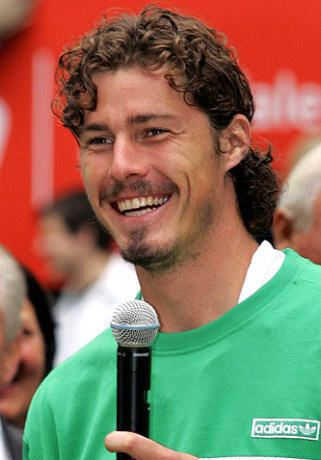
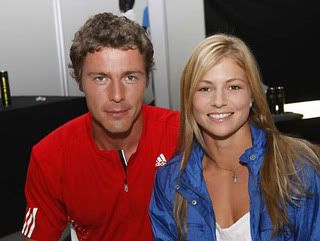



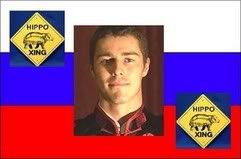




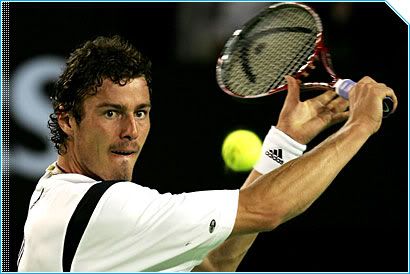



 >:(to me she wins the award for most unsportmanslike behaviour! She is so bad that she even beat out Hewiitt!!!
>:(to me she wins the award for most unsportmanslike behaviour! She is so bad that she even beat out Hewiitt!!!
